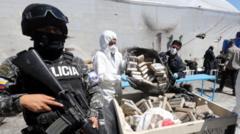The rise of vandalism in cemeteries across Morogoro, Tanzania, where over 250 graves have been targeted for scrap metal, showcases a growing concern within both local communities and government authorities. Families are left mourning not just their lost ones but also the dignity of their graves, propelling a demand for improved security measures and community education.**
Increasing Cemetery Vandalism in Morogoro Sparks Outrage and Calls for Action**

Increasing Cemetery Vandalism in Morogoro Sparks Outrage and Calls for Action**
Grave robbing incidents targeting crosses and grave markers in Morogoro, Tanzania, have left families devastated and prompted governmental and communal initiatives to tackle the issue.**
In Morogoro, Tanzania, a city rich with tradition and history, the Kola Municipal Cemetery has become the epicenter of an unsettling criminal trend: rampant grave vandalism. Over 250 graves have been desecrated as metal thieves seek to capitalize on the demand for scrap metal. Thieves, often active during the night, strike when there is little to no security presence allowing them to steal items such as metal crucifixes and grave markers.
Pudensiana Chumbi, a longtime visitor to the cemetery, shares a heartbreaking story of despair. Having buried her mother in 2000 and her daughter in 1997, both of their graves have been targeted multiple times, leaving her in a state of mourning not only for her loved ones but for the respect and sanctity of these resting places. The emotional toll is substantial, with families like Chumbi's suffering repeated grief as they grapple with the desecration of their loved ones' graves.
The theft of grave markers is driven by a troubling economic backdrop where vulnerable individuals are desperate for money, often resorting to crime for meager earnings. Prices range from 700 to 870 Tanzanian shillings ($0.27-$0.34) per kilogram, which while minimal, can provide basic sustenance. As one anonymous thief described, the process typically involves removing the metal with tools and then selling it off to unscrupulous scrap metal dealers who often overlook the legality of their acquisitions.
Local scrap metal merchants, however, are not entirely innocent in this scenario. Some dealers have reported receiving stolen goods in the past, but efforts by those like Izire Ramadhani to report such thefts have presented a mixed outcome; after a brief decline in thefts following police intervention, the vandalism has resurfaced, necessitating renewed calls for criminal enforcement and community cooperation.
Morogoro's health officer, Dr. Ndimile Kilatu, advocates for a combination of physical barriers and greater community awareness to help richen the protective measures necessary for cemeteries. Despite these intentions, the implementation timeline remains uncertain and hampered by resource constraints.
The Tanzanian government, under Deputy Prime Minister Dotto Biteko, echoes this sentiment emphasizing the importance of adhering to regulations within the scrap metal industry, advocating for education about stolen goods for both sellers and buyers, and stricter enforcement of the law. Pastor Steven Msigara, a religious leader in the area, also calls for collective community action to rebuild the sacred dignity of grave sites.
Families like Ms Chumbi's are not only mourning their losses but are actively seeking solutions to restore their loved ones' graves. While she plans to replace her mother's cross for the second time, opting now for more enduring concrete rather than metal, the broader hope remains that through concerted community action, governmental support, and education, the graveyards in Morogoro can once again become places of peace and respect for the deceased.



















